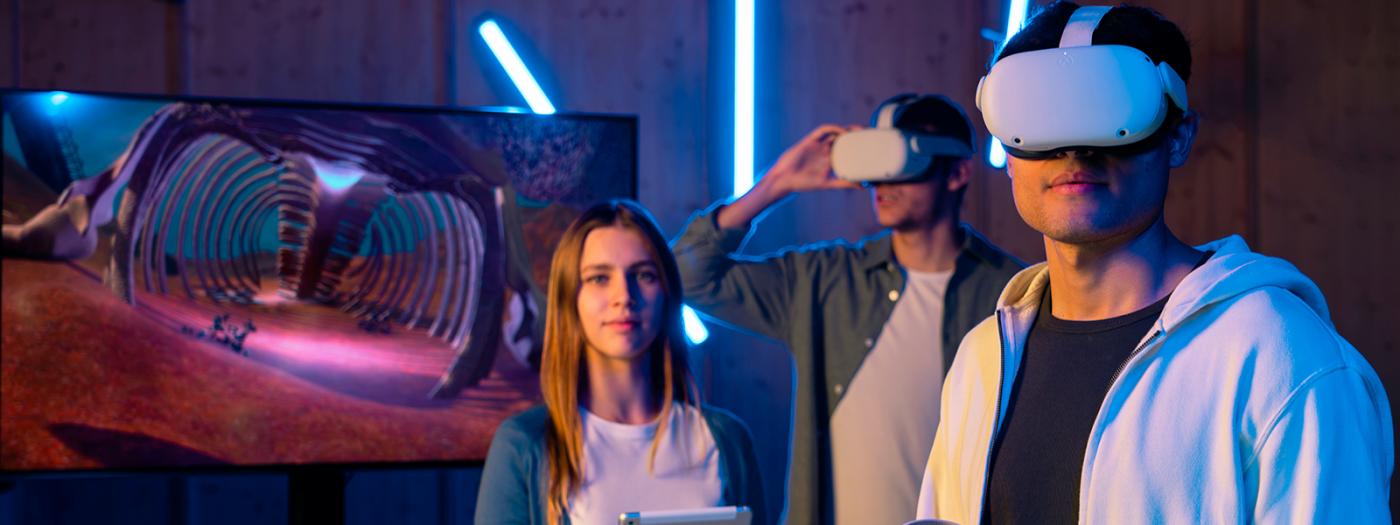The present documentation collects information on the operation of the subject "Development in web environments" (DEW) of the curriculum of the Degree in Software Application Techniques (GTAS).
It is important that the student reads all the sections carefully, that the doubts that arise are clarified with the teachers involved and that he takes this document as a reference point throughout his participation in the subject.
The context of the subject is then placed and its study is motivated, the teachers involved are presented and the students indicative dedication is indicated so that they have a satisfactory learning. Then the objectives, the learning outcomes, the competences that are exercised, the teaching methodologies, the formative activities and the evaluation system are exposed, including also the description of the contents, the planning according to the academic calendar and a set. of bibliographic references.
The aim of the subject Development in web environments is for students to acquire the knowledge needed to Develop Applications using web technologies.
The technologies used and taught are HTML, CSS and JavaScript. They are currently the standard recommended by the W3C (World Wide Consortium) and considered the best for Web Development.
The level taught in the subject is high, using the new standard HTML5, CSS3, SCSS, JavaScript objects and libraries, GUI editors and automations simulating a real work environment, for example, with Node.js
The lecture has a working intensity of 6 ECTS credit, that is equivalent to 150 hours of dedication for the student.
Titular Professors
Learning Goals of this subject are:
RA.01 - Being able to build computer applications based on client / server and web architectures.
RA.03 - Knowing and applying programming techniques of services and telematic applications, in network and distributed.
RA.04 - Necessary and basic knowledge about the tools of ..
The subject is divided in the following topics:
1st Topic. Web fundamentals: Introduction to the history and its ecosystem evolution and its web architecture.
2nd Topic. HTML: HTML language definition, types, tag taxonomy and language structure inside HTML documents for the development of valid standard semantic webs.
3rd Topic. CSS: CSS introduction, responsive web and its use as a visual HTML document formatter.
4rd Topic. JavaScript and connectivity: Introduction to DOM, language coding methodology for managing the DOM. Introduction to methods, models and data formats used in the web communication between client and server.
The subject learning approach is based on the following learning methodologies:
Theory lectures
Problem solving and exercise lectures
Hands-on lectures
Seminar
Tutoring
Each of these methodologies are applied based on the following descriptions:
Theory Lectures
Theorical concepts are exposed by the teacher so that the students can learn them. The teacher can provide materials and the student can take notes and/or complete with supporting materials. The student can intervene either to solve doubts and/or to answer the questions asked by the teacher.
Problem solving and exercise lectures
Problem solving and/or decision making using the knowledge learned. The teacher can invite the student to participate in class to assess the acquisition and / or interpretation of the concepts presented.
Hands-on lectures
Problem development and/or decision making using the knowledge learned. Specific equipment is used, such as a computer, or other material from laboratory or workshop.
Seminar
Reflection, specialization in contents previously learnt by the student or expansion of new knowledge related to the area of study.
Tutoring
Orientation, attention and/or personalized evaluation with a student or group. It is a teaching practice that is usually compulsory for the student who follows a learning program and / or that is a complement to non-presential work.
In order to evaluate the subject, some evaluation systems and some weightings with respect to the 100% of the final grade of the subject have been defined. These are:
Evaluation system Weighting
E1 Exercises, problems and practices (Nepp) 90 %
E2 Class participation (Nparticipacion) 5 %
E3 Porfolio(Nportafolio) 5 %
The final grade of the subject is calculated according to the expression:
NFinal = 0,9*Nepp + 0,05*Nparticipacion + 0,05*Nportafolio
To apply this average, Nepp, and Nportafolio must be equal to or greater than 5. Otherwise, the average is not calculated and you will go directly to July recovery. The individual calculation:
The score of exercises, problems and practices (Nepp) is the result of 30% of continuous evaluation exercises (Nejercicios), 20% of the presentations and 50% of the score of practices (Npracticas). The exercises of continuous evaluation are opened and delivered the same day of class. There is no minimum grade for each practice, but they must be delivered with an average of 5. Therefore:
Nepp = ( 0,3*Nejercicios + 0,2*Npresentaciones ) + 0,5*Npracticas
If the grade of exercises and presentations is not passed in ordinary convocation (end of 1st semester), then a recuperation exam must be carried out in July (Ex_recuperacion), being in this case the grade of exercises, problems and presentations equal to the grade obtained in this exam.
Nepp = 0,5*Ex_recuperacion + 0,5* Npracticas
With respect to the practices score (Npracticas) this is calculated as the average of all the practices. You must obtain a grade equal to or higher than 5. If you do not pass the practical grade in ordinary call (end of 1st semester), then in July there is an option to submit the recovery project (Npj_recuperacion), being the practical grade equal to the grade obtained in this project.
Npracticas = Npj_recuperacion
There is no extraordinary call for February, only the recovery of July.
Any detection of copy in any activity, exercise, problem, practice, project or portfolio could result (in regard to copies regulation in the direct failure of the subject without any recovery possibility.
W. (2010, August 9). HTML5 Reference. Retrieved from https://dev.w3.org/html5/html-author/
M. H. (2019, January 13). Eloquent JavaScript 3rd edition. Retrieved from https://eloquentjavascript.net/
